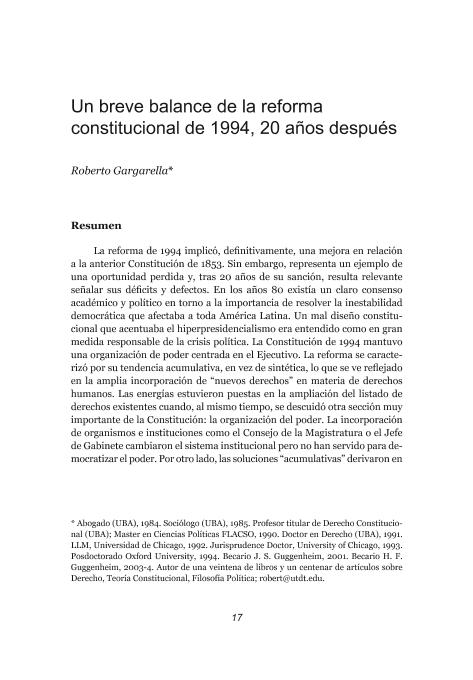Mostrar el registro sencillo del ítem
dc.contributor.author
Gargarella, Roberto

dc.date.available
2020-09-01T14:41:40Z
dc.date.issued
2015-09
dc.identifier.citation
Gargarella, Roberto; Un breve balance de la reforma constitucional de 1994, 20 años después; Universidad de Buenos Aires; Pensar en Derecho; 5; 9-2015; 17-34
dc.identifier.issn
2314-0194
dc.identifier.uri
http://hdl.handle.net/11336/112879
dc.description.abstract
La reforma de 1994 implicó, definitivamente, una mejora en relación a la anterior Constitución de 1853. Sin embargo, representa un ejemplo de una oportunidad perdida y, tras 20 años de su sanción, resulta relevante señalar sus déficits y defectos. En los años 80 existía un claro consenso académico y político en torno a la importancia de resolver la inestabilidad democrática que afectaba a toda América Latina. Un mal diseño constitucional que acentuaba el hiperpresidencialismo era entendido como en gran medida responsable de la crisis política. La Constitución de 1994 mantuvo una organización de poder centrada en el Ejecutivo. La reforma se caracterizó por su tendencia acumulativa, en vez de sintética, lo que se ve reflejado en la amplia incorporación de “nuevos derechos” en materia de derechos humanos. Las energías estuvieron puestas en la ampliación del listado de derechos existentes cuando, al mismo tiempo, se descuidó otra sección muy importante de la Constitución: la organización del poder. La incorporación de organismos e instituciones como el Consejo de la Magistratura o el Jefe de Gabinete cambiaron el sistema institucional pero no han servido para democratizar el poder. Por otro lado, las soluciones “acumulativas” derivaron en problemas en su efectivización, en la medida en que ciertos nuevos derechos e instituciones entran en tensión con otros ya existentes.
dc.description.abstract
The constitutional reform of 1994 has definitely been an improvement in relation to the previous Constitution of 1853. However, it represents an example of a lost opportunity and, after 20 years of its passing, it is important to point out its deficits and flaws. In the 80’s there was a clear academic and political consensus on the importance of solving the democratic instability that affected Latin America. A bad constitutional design that emphasizes the hyper-presidentialism was seen, to a large extent, as the responsible of the political crisis. The Constitution of 1994 maintained an organization of power centered in the Executive. The reform was characterized by its accumulative tendency, instead of being synthetic, which is reflected in a great incorporation of “new rights” in matters of human rights. The energies were put in the increase of the list of rights when, at the same time, another important part of the Constitution was neglected: the one of the organization of power. The incorporation of organisms and institutions such as the Council of Magistracy or the Chief of Staff had changed the institutional system but were not useful for a democratization of power. Moreover, the “accumulative” solutions implied problems in its effectiveness, as certain new rights entered in tension with old ones.
dc.format
application/pdf
dc.language.iso
spa
dc.publisher
Universidad de Buenos Aires

dc.rights
info:eu-repo/semantics/openAccess
dc.rights.uri
https://creativecommons.org/licenses/by-nc-sa/2.5/ar/
dc.subject
Reforma constitucional
dc.subject
Derechos sociales
dc.subject.classification
Derecho

dc.subject.classification
Derecho

dc.subject.classification
CIENCIAS SOCIALES

dc.title
Un breve balance de la reforma constitucional de 1994, 20 años después
dc.type
info:eu-repo/semantics/article
dc.type
info:ar-repo/semantics/artículo
dc.type
info:eu-repo/semantics/publishedVersion
dc.date.updated
2020-08-28T18:47:18Z
dc.journal.number
5
dc.journal.pagination
17-34
dc.journal.pais
Argentina

dc.journal.ciudad
Ciudad Autónoma de Buenos Aires
dc.description.fil
Fil: Gargarella, Roberto. Universidad de Buenos Aires. Facultad de Derecho; Argentina. Universidad Torcuato Di Tella; Argentina. Consejo Nacional de Investigaciones Científicas y Técnicas; Argentina
dc.journal.title
Pensar en Derecho
dc.relation.alternativeid
info:eu-repo/semantics/altIdentifier/url/http://www.derecho.uba.ar/publicaciones/pensar-en-derecho/revista-5.php
Archivos asociados
